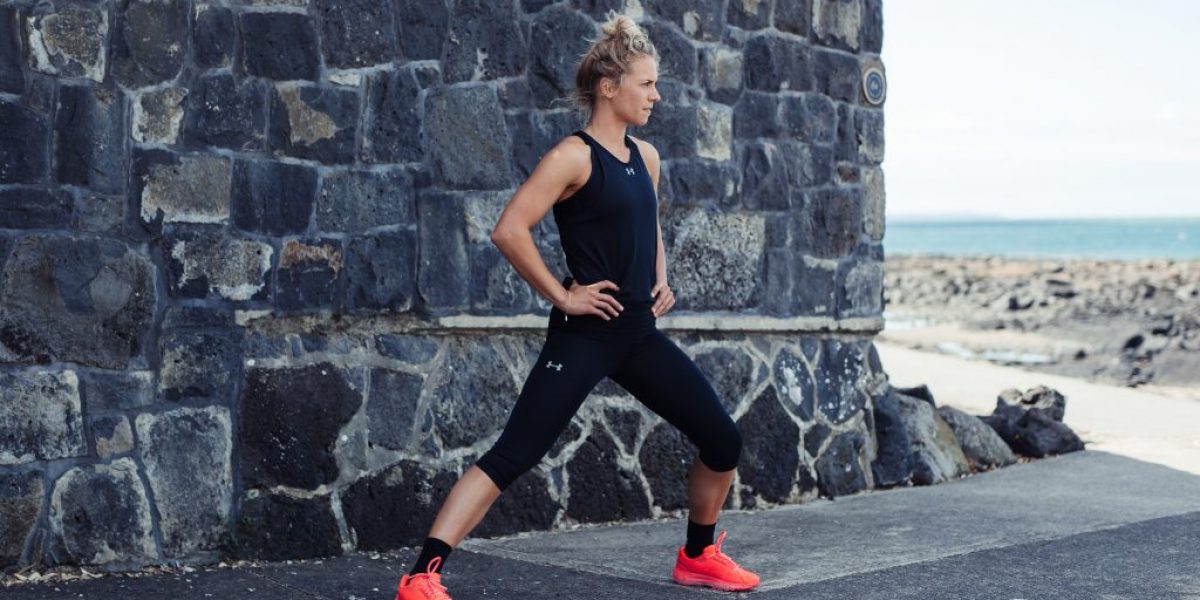Dr. Hannah Wells Shares Her Lockdown Routine
Up until this year, Dr. Hannah Wells was juggling life as a medical researcher in the field of biotech engineering, and a champion triathlete. Either one would be more than enough for any mere mortal. This year though, Hannah is throwing everything into her sport. Well as soon as lockdown is over. Hannah shares with us her lockdown routine, how she has juggled both lives and her tips for staying focused and disciplined in any situation.
Images by Logan Dodds
How’s the lockdown routine going for you?
I’m pretty good actually. It’s not too different from what it would be had we not been stuck in a pandemic, other than swimming for me. Obviously swimming is a bit of a struggle, but biking and running hasn’t changed too much.
I do a lot of my biking indoor on a wind trainer because it’s more time efficient and you can be more specific on your workout, rather than going out on the road. It hasn’t been too bad. I’m keeping myself busy.
Are there other things that you can do to emulate swimming?
We can do dry land work. It’s obviously nowhere near as good as the real thing, but it just keeps the right muscles activated and strong. We have a few different exercise routines that we can do with bands, so I’ll start doing that every day.
One thing that’s always interested me about particularly successful athletes is that the mental side of things crosses over into other areas. Can you talk a little bit about how you balance your athletic focus with your academic focus and how they might feed into each other?
There’s definitely crossovers between the two in terms of hard work and the ability to manage workload and be smart about how much you’re doing. I try not to overdo it too much in any area and that way it’s more manageable and maintainable over a longer period.
In terms of managing both, obviously it’s pretty tricky. As of 2020, I am no longer working as I was previous to this year. I was working four days a week last year and because triathlon was going so well for me, I decided to take the plunge and I left work this year. Prior to that, I was balancing both and it actually worked quite well for me.
My job was mostly desk-bound, apart from when I went into the lab, which wasn’t that often. I had a good balance between doing my training and then coming home and sitting on my laptop and spending a few hours off my feet, trying to just nut away at some work.
Sometimes there’s still that mental fatigue that you get from both training and work. It was more about managing that and just making sure that I wasn’t too exhausted to carry out one of those tasks, whether it be work or training.
Mental fatigue was definitely the biggest struggle for me in previous years. There’s a number of things that you can do to combat that. The obvious is just managing the load and knowing what your limits are. I’ve done a fair bit of mental training and I do meditation to try and clear the mind and keep fresh.
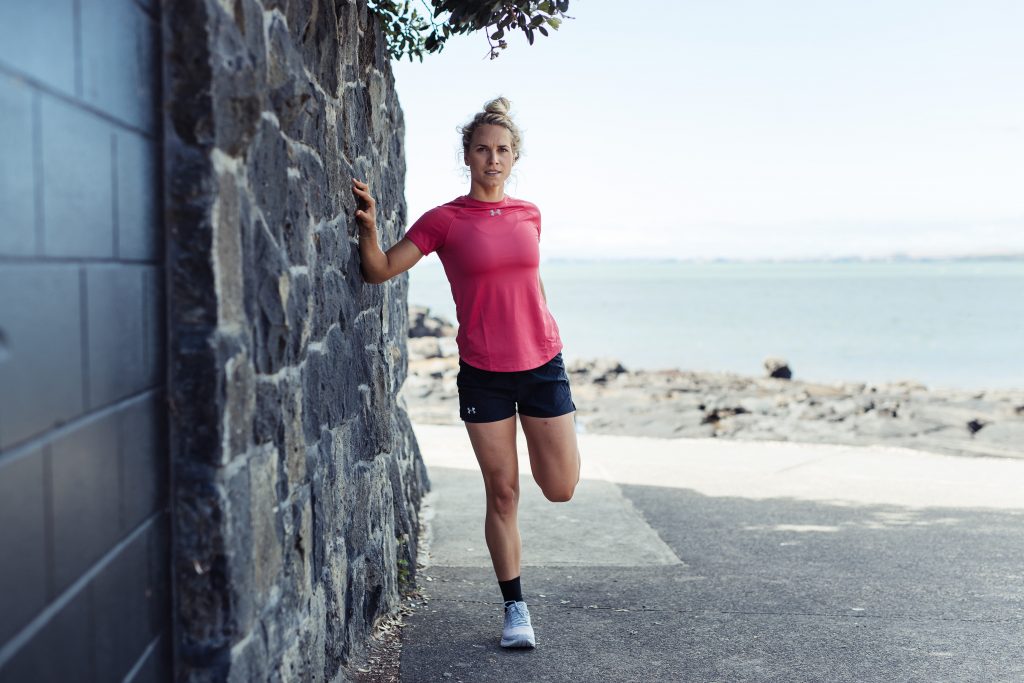
Do you find that you have a predisposition to not manage the load, because if you’re a high achiever in different areas, you probably want to keep pushing yourself. Was that a hard thing to overcome?
Yeah, it is. I am constantly being held back by my coach. For me, motivation is not the issue, it never really has been. It’s definitely managing the load and having a coach, or in the work instance, it was my boss, to just keep an eye on things and say, ‘How about we push that out a little bit longer?’
There’s definitely been times where I’ve probably been a little bit too close to burning out and you learn from those times. It’s definitely a case of trying to hold back and not do too much.
Did you always have this drive and motivation?
I always loved being active as a kid. I loved all sports. Have I always had this drive? No. I’ve always had a reasonable amount of drive but not like I do now. I think most teenagers are a little bit lazy at times and I was no exception to that.
Obviously you’re going through a lot of development in those ages, so sleeping in, for example, was definitely something I did when I was younger. Whereas now, I wake up in the morning and I’m up and out of bed and ready to do things. I don’t believe anyone is born totally driven. I think it developed over years of habit.
What was the catalyst for you to force that habit?
I love just trying. I think I’ve just developed a love of getting better at what I’m doing. Personal improvement is a big motivation of mine. Why not see what you can do? You might as well. We’re here for X amount of years, so you may as well just crank out as much as you can.
It’s hard to put into words, but it’s definitely just developed over the years through the love of wanting to do well and see what my limit is and learn, as corny as it sounds.
I believe anyone could have that mindset. A lot of people say, ‘Oh, I could never train like you do.’ Or ‘I could never get a PhD.’ But I think honestly, absolutely anyone in the entire world could. You just need to develop that habit of knowing how to continually work pretty hard and stay committed for a long time.
If you look back as to what you have achieved, would you have done that again? Would you have studied for a PhD and trained the way that you have?
I think when you look back and you look at it all together, it’s a little bit overwhelming. When I look back I’m like, ‘Oh, there was a lot of work that went into that.’ If I had to do it again, would I be able to? I don’t know. But then if you actually just don’t think about that broader picture and you break it down into the smaller goals and timeframes, then it’s much more manageable than it would be if you lumped it all together and look at it as one big massive goal.
One thing led to the next and both my sporting career and doing a PhD just developed over time. I never had the intention of doing a PhD, it just developed into that. The opportunity came with a scholarship and next minute, I’m doing it.
You look ahead at the three year prospect of doing a PhD and you think, ‘Man, I don’t know if I’m going to be able to do that.’ But you just tick along and you focus on what you’re doing at the time and then you get there. If I was to look back and ask, would I do it again? Probably, but I wouldn’t want to think about the big picture too much.
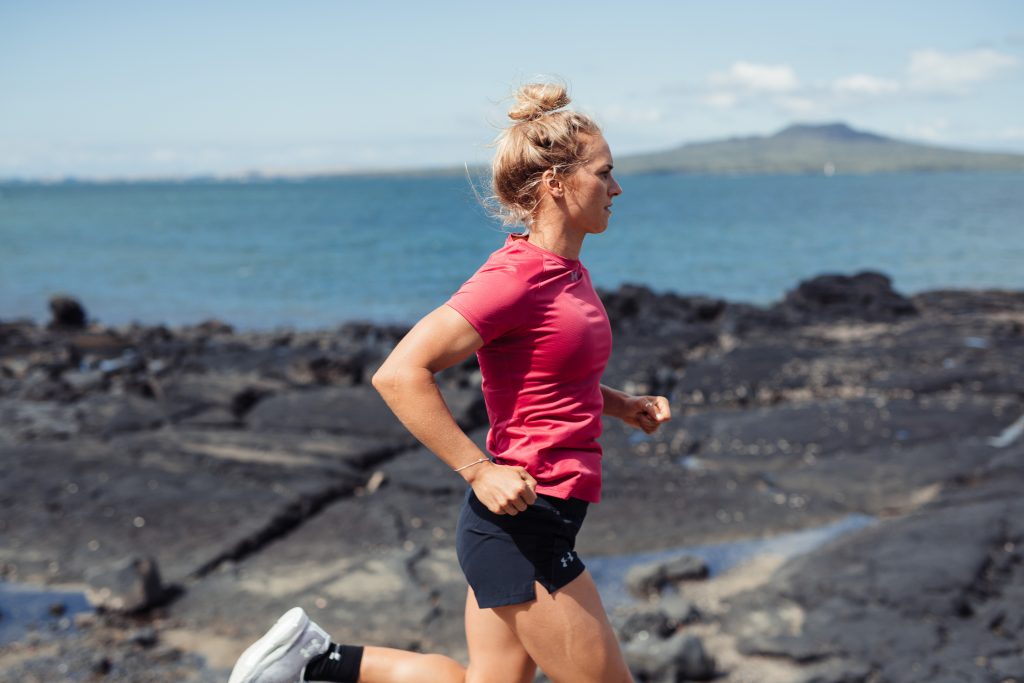
A lot of people talk about having long-term goals, but what you’re talking about is being open to opportunities as they come.
I think long-term goals are a good thing for some people, that’s very individual. I personally am not too fussed on the huge long-term goals. I’m more focused on what my next step is with the broader awareness of where I might be heading in the long-term.
I think also having the ability to adapt in this day and age with so many different opportunities now is important. Keeping most of your mindset on where you are now and what’s around you now is just an easier way to navigate your way through.
I think a lot of people are going to be sitting around now wondering what’s next for their industry, what’s next for their job. So adaptation is a really strong keyword at the moment. Would you have any advice in a broader sense around changing and adapting?
If you’re not used to having to adapt, it’s a pretty hard thing to get your head around initially, but I think it is a good thing to develop. I think the sooner we can be open to adapting to whatever’s happening in our lives and staying positive around whatever happens and just try to find the best in whatever opportunity comes, the better. But it is easier said than done, I totally appreciate that. Just try and stay positive around it and make the most of any opportunity that comes.
Mental wellbeing is going to be pretty important in a few weeks time, so I think we’ve got to take care of each other and be very aware of your own mental wellbeing as well. If you see yourself starting to go down a negative path, try and get on top of that early rather than later. That might just be talking to the people around you or doing more meditation.
If this had happened 10 years ago, it would have been entirely different in terms of how we connect to the world through social media. You have a bit of an Instagram following, is that a big focus for you? Do you connect with lots of people that way?
I connect with people often. Whenever people send me a message, I always try to message back. I want my social media to be pretty organic. I’m not putting a huge amount of effort into specifically going out and trying to get all these followers on my social media. That’s not really how I want to approach it.
I just post things about what I’m doing and hopefully people can find inspiration in that and do want to follow me. It’s very much just me and my everyday life, nothing super fancy. Just a few tips here and there to try and keep people happy and positive and motivated to keep fit and well in their life. That’s my aim of my social media.
Do you get that sense that you are a role model?
I am starting to get that a lot more. For example, when I got to races, I find that often it’s the younger girls, and actually some older ladies as well, come up to me and say how much they love following me on social media, because it is nothing fancy. It’s who I am.
It is really cool to get that feedback. I have mums coming up to me saying that their daughters follow me and I’m the kind of person that they want their daughters to follow, which is really nice. That fits exactly what I want to be on social media.
It’s encouraging for me to just keep doing what I’m doing, post the odd random thing on social media of what I’m up to and hopefully I can continue to be a positive influence, on the younger generation in particular, but also whoever else is out there wanting to say fit and well.
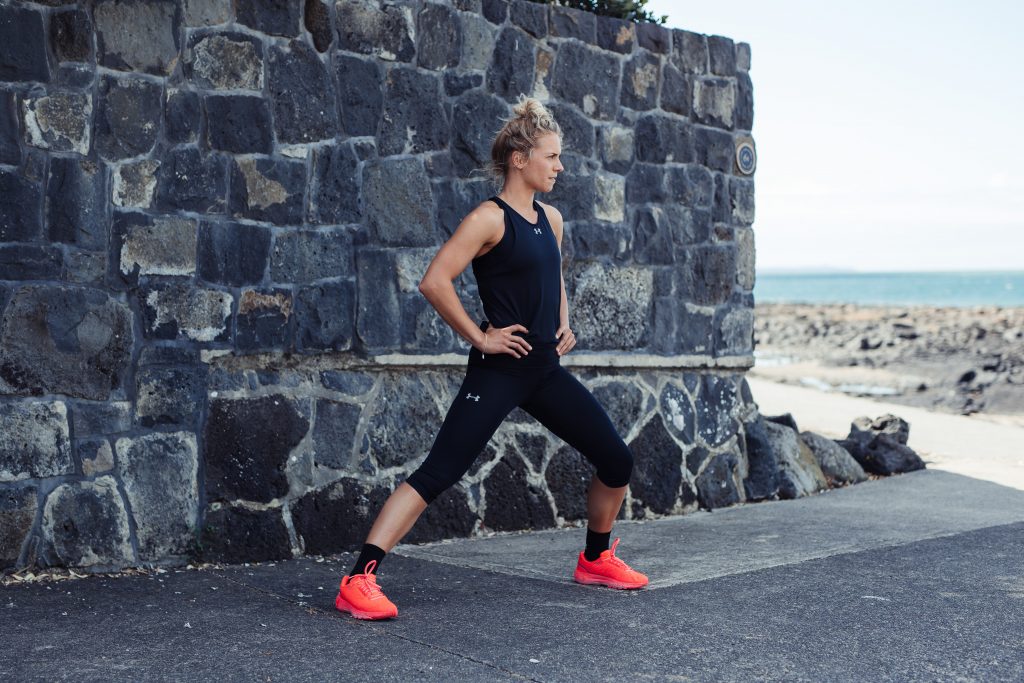
What was the catalyst for becoming a triathlete?
I didn’t do triathlon or swimming, biking or running when I was at school. I was actually a netball player, a volleyball player and did various other team sports. I have no background in it, which is a bit odd.
I didn’t start triathlon until I was 23, which is quite late. I stumbled across the triathlon club when I was at university in Palmerston North. I love the training, so I do quite like hard work and triathlon is hard work a lot of the time. You’re swimming and you’re biking and you’re running a lot and pushing your body. Just hard work basically, I did really enjoy that.
Coming from a team sport background, you’re surrounded by people your own age only. Which is cool when you’re at school, but then at university when I joined the triathlon club, there were people of all ages. People younger than me, kids from school and then there were also adults much older than me.
You’re in the triathlon community, you’re mixing with a whole range of people and you can learn a lot from all of those people. I just found that was a really cool community to be part of and it was something new for me at the time. I had a lot to learn and I was really enjoying seeing the improvement early on.
With the coaching group that I’m part of, it is just a really fun environment to be part of. Being able to motivate people and be motivated by the other people around you, from all ages and all backgrounds, is really cool.
And to be honest, I do just really love the training and the sport as well. I love swimming, biking and running. That’s why I’ll continue to do the sport as long as I can.
There’s a nice variety within the sport itself.
Yeah, it’s really three sports in one which is cool. So if you do end up with an injury, say from running, you’ve still got swimming and biking, so there’s always something you can do. A lot of people like that aspect of triathlon.
It also means that there’s a lot of training to be done and it can be quite consuming. There’s the good points and the parts that you have to be aware of. It is a great sport and it’s a great sport to keep fit and well and a good way to make friends and meet people from all ages and develop that full community around the sport you’re doing.
Can you talk about the catalyst for the engineering side?
When I went to university, I didn’t start in engineering, I started in food technology. I had an interest in nutrition, probably just because I liked food and I did also like the idea of developing new technologies.
Food technology was a course that was introduced to us in high school. Career advisors from the university came to our school and introduced this new course that was coming out, so I signed up for that. Two years into that four year degree, I actually realised that the papers that I was enjoying the most were the engineering papers, so I decided to switch. I just really liked with engineering the ability, or the freedom, to develop new ideas.
It also a very challenging degree, obviously and I liked that aspect of it too. Being a female, I was the minority, I found that also being a bit of a challenge. I liked trying to prove that anyone can do it. You don’t have to be what someone would picture as an engineer, because I’m definitely not that.
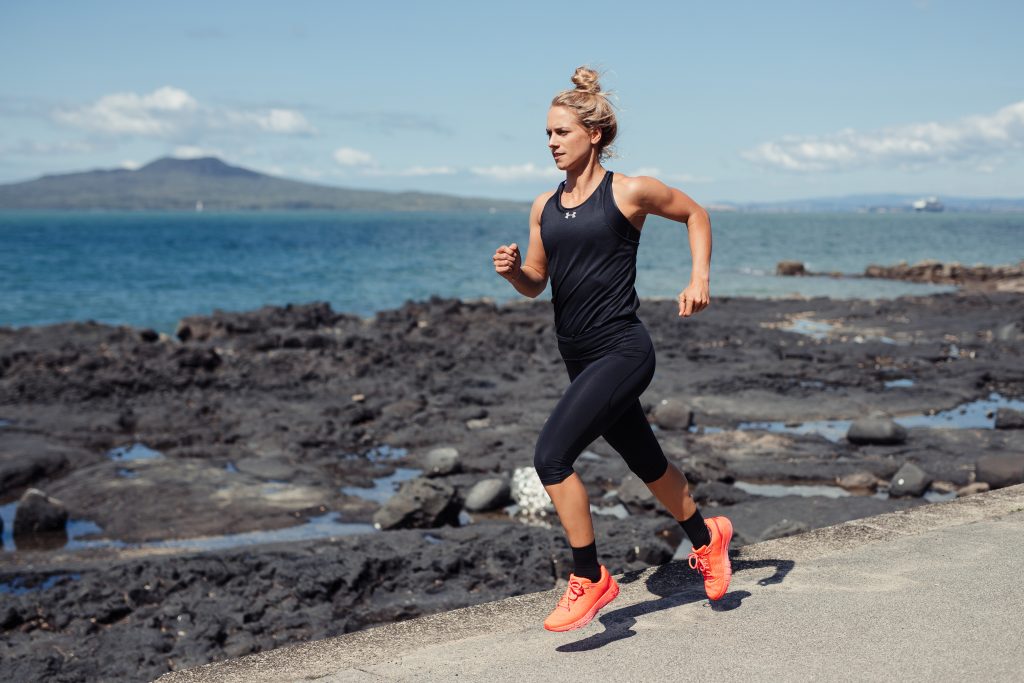
Was that a hurdle?
Sometimes, but it depends. You could almost see it as a challenge and spin it around and see it as a positive. At times, maybe it was hurdle, but it can also work in your favour and it’s also motivating to hopefully show other girls and anyone else that anyone can do engineering.
Don’t be afraid to give it a shot if that’s what interests you. You’ve got to go and do it and don’t let anyone tell you that you can’t.
Did you find that you were able to bring new insights into the world of engineering, not being a typical engineer?
Yeah, totally. I remember even back at university, when you often ended up doing group projects and often it would work out that there would be someone else in the group that had strengths that complemented my weaknesses. And then I was able to bring something new to the group; my strengths weren’t necessarily their strengths.
Everyone has different strengths and weaknesses. There have definitely been times where my views aren’t quite the same as some of the other people’s views that I’ve worked with, but that’s not a negative necessarily, I think that’s definitely a positive. I think all jobs, all workforces, all industries, need that. So the more diversity we can see in engineering, or any other industry, the better.
What was the thought process for you to make the decision in 2020 to drop one thing and then focus on the other thing? Was that a difficult time?
It was a difficult decision. It was tricky and I was a little concerned about what I would do to fill up some of my mental space. But I had a lot of support from my partner and from my coach. They told me they that for now, while I’m young and fit and going well, it could be the right decision to make, to commit to my sporting career for a while.
I can always go back to engineering or academia, I wouldn’t be able to do triathlon forever. I think it was the right decision to make. I was struggling at times, you get to the point where you’re maybe almost pushing the boundary of doing too much.
There were a couple of times where I was probably pretty close to that, just trying to fit everything in. I was aware of that and I didn’t want to fall into the trap of not doing either of them to my best ability.
Both were getting busier. Triathlon has been going pretty well for me and then that meant that I was wanting to do more races and go to more competitive races overseas. Also, as my career had been moving along in engineering, that was also getting busier and busier. So, I would have had to make some decisions at some point, rather than doing both.
The thing is that I can always go back to one or the other, as long as there’s a job obviously. It was hard to say goodbye to the job and the people that I was working with. I had really good people around me in my job, but that’s okay. I’m still in contact with them.
It’s also very exciting to see what I can do when I do focus on just one of them. Having the ability to recover a bit more and focus on triathlon for a bit and give it my best shot, knowing that I may as well while I’m young and fit.
What sort of shift did you notice when you were able to put the focus on one area?
I have definitely noticed a change in how tired I felt all the time. Last year, I was waking up quite early to go to training. Swim squad started at 5:45 in the morning, so that was a 5:00am wake up. Now I have the ability to sleep and not set an alarm most of the time.
Just getting that extra sleep alone makes a huge difference to recovery. Just having more time to put my legs up and, with that mental fatigue, not having to balance or manage that so much. I can spend more time recovering, doing meditation and so on.
I have definitely noticed a difference with my general energy levels since stopping work. Once the world returns to normal, it’ll be pretty exciting to see what we can do. It also means that I can put more energy into sponsors and just doing more things, not just as an athlete, but in the community.
Even on my social media, for example, because that all takes time as well. As well as just training hard and racing, hopefully I can put some helpful messages out there as well. We’ll see what happens, hopefully the world is back to normal before too long.
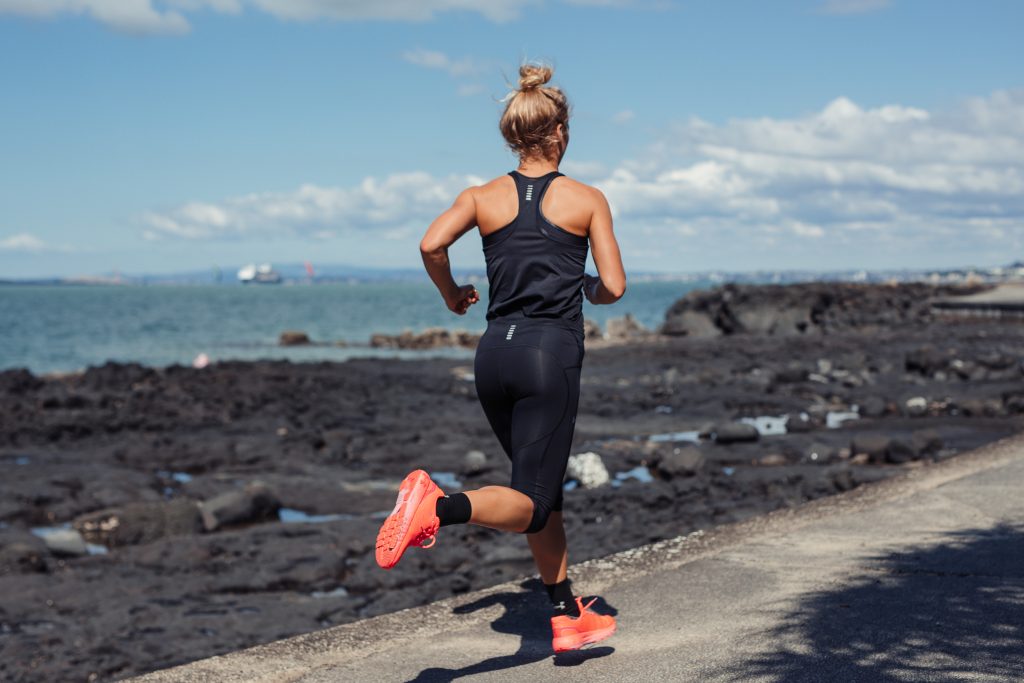
In terms of being a professional athlete, where does the revenue come from? Is it a juggle?
It’s pretty hard in a minor sport, like triathlon. We get no support from the government sporting bodies because we’re not an Olympic sport – a short triathlon is, but I do the long course stuff. You are left to your own devices to figure that out for yourself.
Sponsorship can be pretty tricky, especially in New Zealand because we are a small country. You don’t really want to be in a position where you have to rely on prize money because if you get an injury, that’s out the window for X amount of time.
It is tricky. I’m slowly getting there but hopefully more opportunities will come the more I put myself out there. Now that I have a bit more time to do that, I’ll be able to put more energy into that as well and get out into the community a bit more. It’s a work in progress.
In terms of the sponsors, are there any that support you that we should support?
Subaru New Zealand, Under Armour and I am also supported by a wetsuit company called Deboer Wetsuits, but they are based overseas mostly. Those are my main sponsors at this current time, I am hopefully talking to a few others.
How did the sponsorship relationships come about? Do you start buying Under Armour gear and go, ‘Oh, these shoes are really cool’ and then talk to them?
It could be that I try a product and really like it and contact them. Or it could be that someone contacts me and says, ‘Hey, do you want to try our product, see how it goes and then maybe we can talk about working together on something?’
It’s a little bit of both and it always takes a bit of time because you’ve obviously got to make sure that the product or services works for you, otherwise it would be a bit of a nightmare to try and organically promote it. You want to make sure that what you are representing is something that easily fits into your life as well. It always takes time and I’ve got to make sure that both the company and myself are happy.
I’ve got a four and a half year old daughter and I would love for her to come out with the mindset that you have, that a hurdle is a challenge and anything is possible. Any advice that you’d have for me to be able to instill that in her?
My parents never put any limits on what I could do. Just always be supportive, don’t put any limits on what girls can and can’t do. And just a whole lot of encouragement as well, that’s what I got as a kid. Don’t give up, but always remain humble.
When something doesn’t go your way, you have to accept that and move on. My parents definitely had to teach me how to be a good loser because I was very competitive as a kid. There’s going to be times where you may fall short, you’re not always going to be the one that wins everything.
So when you don’t, it’s about always giving your best and when it doesn’t work out, just accepting it and then picking yourself back up as quickly as you can, because there’s plenty more opportunities and challenges out there. Just be prepared for whatever is coming and stay positive. Be willing to take on anything that comes your way.
In terms of the losing thing, do you think a little bit of tough love is good as well?
I think so. It’s okay to not win. I don’t think we need to always achieve our goals, because that’s how we learn. We always have to try our best. I think we should always be encouraging kids to try their best and if it doesn’t work out, life will still go on. What’s next? What can you do better the next time?
No one really minds if you don’t achieve your goal. If I go into a race and I don’t win, that’s just how it goes. No one’s really going to mind. I think a lot of us are very scared of failing, but I think we can’t be scared of failing. We should be more afraid of losing the ability to always just give it our best, not necessarily the actual failing part of it.
Currently, we’re at home, we’re spending more time with our families than we have spent before. We’ve got more time with ourselves. It seems like there’s a wonderful opportunity to maybe reset some things that we weren’t happy with about ourselves and look at some new goals. Would you have any advice for that process of setting those goals?
I think it is a very good opportunity for us to do that and reflect on where we’re heading, because we can get caught up in the day-to-day world and ticking over in our little routines. I would say writing goals down always helps.
I think it’s a good opportunity to talk to our families and get into some good deep conversations about what we want to do. If we had the opportunity to start something new, what would that be? It is a good opportunity to reflect and talk about those goals or dreams that we might have, but not really have the time to think about because we’re just going along in our jobs.
Maybe this is an opportunity to, say if you do have the desire to one day start your own business, why not put down some things on paper now while we’ve got the time?
It could be a good option to do stuff like that. Talk to our partners and see what would they do if they had the opportunity to start something fresh. Who knows where the conversation could go and what could come of it.
Day-to-day, you’re busy, you’re commuting and you don’t take the time to sit back and actually have that conversation with your loved one. The question of, if you weren’t doing what you’re doing now, what would you do? It’s a fun conversation to have I think. And that can start the reflection of what we’re doing and are we enjoying what we’re doing and can we do something different?
What would you do if you weren’t a triathlete?
I do love sports so much. I probably would still do some sort of sport. I would’ve quite liked to do more hockey when I was at school. I really enjoyed hockey, but I gave it up because it clashed too much with netball. I would still do some sort of physical activity because for me, I just love keeping fit and well. I honestly could do any sport, that’s the problem because I just love keeping fit and active.
Would you have any advice on the nutritional side on how do we keep healthy and mentally fit over the next few weeks?
What you usually do for nutrition and your food habit, I would try and keep it the same. If you pack your lunch for work usually, pack your lunch like you normally would. Keep your usual routine as much as possible and try not to splurge out on the crappy carbs and the chocolate. Try and keep your usual routine as much as possible.
It’s also an opportunity to try and spend a bit more time preparing your meals and making them healthier, so why not put a bit more effort into your lunch? Rather than just having something premade, put together a really nice salad. You have the time now, you might as well branch out and try some new healthy recipes.
If people are really struggling, just try and maintain your normal routine of what you would do when you go to work. Prepare your meals the same as you usually would. If you’ve gone and stocked up on all the carbs, you might not be buying pasta and bread for a little while because you probably shouldn’t just be eating pasta and bread for the next four weeks.
What’s the best piece of advice that you’ve ever been given?
This sounds really generic, but just always treating people kindly and trying to see their view in any situation as well as your own. I think a good attitude and being kind to people will take you a long way, a lot further than many other things.
I think who you are as a person is far more important than any achievement that you do in your life. Just always try to be a good person over top of anything else is probably the best advice.
